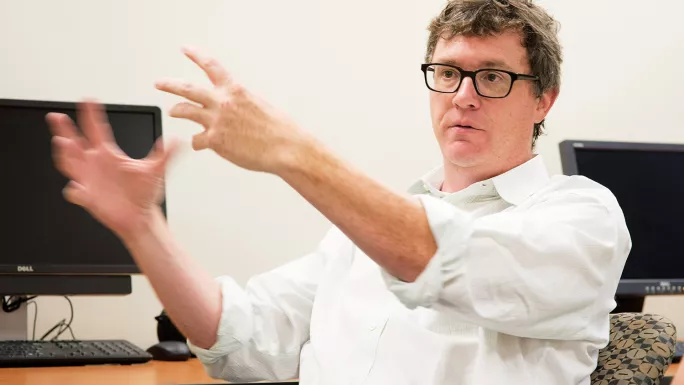
- Home
- Practice makes perfect? Not without natural ability
Practice makes perfect? Not without natural ability

A common assumption is that practice makes perfect: if you do something for long enough, eventually you will master it.
And the research of Anders Ericsson, Conradi Eminent Scholar and professor of psychology at Florida State University, seems to suggest there is much truth in that statement; his theory of deliberate practice essentially states that if you get expert feedback and practise lots, you can become an expert yourself.
It’s a message that has been embraced by teachers, with Ericsson’s work often cited in education debates. But Zach Hambrick, a professor in the department of psychology at Michigan State University, has serious reservations about the fêted role of practice in creating expertise. In fact, he argues that deliberate-practice theory leads both parents and teachers to distort the path to expertise, making it more difficult to nurture.
Hambrick is an unlikely critic of Ericsson because he used to work for him while studying for his PhD in experimental psychology from the Georgia Institute of Technology. “I spent a summer working in his lab [at Florida State] and it was a fantastic experience,” recalls Hambrick. “It was not long after he had published his now famous and classic 1993 article [‘The role of deliberate practice in the acquisition of expert performance’], which was the possible inspiration for Malcolm Gladwell’s 10,000-hour rule [from the book Outliers: the story of success].”
This encounter with Ericsson sent him down the path of studying expertise, but he found his route pivoted away from Ericsson’s theories. “Ericsson argues that you can largely explain differences across people in terms of how much so-called ‘deliberate’ practice they’ve accumulated,” says Hambrick. “That’s the crux of his argument.
How important is practice?
“No one doubts you have to practise to become an expert in anything. We’re not born with specialised knowledge. The controversial claim, however, is you can account for all, nearly all, or certainly at least most, of the differences across people in terms of how much practice they have accumulated. If you were to take the example of an elite performer like Usain Bolt and ask why he is so superior, well, according to this perspective, it has a lot to do with how he’s trained rather than any basic abilities or capacities that give him an advantage.”
This idea just didn’t sit right with Hambrick. He wasn’t convinced by the evidence used to substantiate Ericsson’s theory and he started to become sceptical about how large a role practice actually plays in exceptional individual performance.
“To acquire the specialised knowledge that’s necessary to play a sport, or to be a journalist, or to play chess, or whatever, an individual has to train. But the perspective that was emerging for, say, the last half century, and then picking up steam in the 1990s, was this is pretty much all we need to worry about,” he says. “That led me to re-examine previous findings and conduct some of my own original research; and what this research found was that in terms of accounting for differences across people - individual differences or ‘interindividual variability’, as we call it - it turns out the accumulated amount of training accounts for a sizeable amount of the differences across people in terms of accomplishment, but other factors explain more and the question still remains: what are these other factors?”

Hambrick says there are some clues as to what some of these other factors might be - basic cognitive abilities, for instance - but he feels that more research needs to be undertaken in this area to definitively establish what the factors are. Thus far, the findings have a couple of practical implications.
“One is that kids should explore different things to see what they seem to be good at initially and also what they enjoy doing,” he says. “The best work that’s been done on this to date is in sports. There is a striking trend in parenting culture these days, which is the early specialisation approach and Tiger Woods is kind of the poster child for this.
“So parents are pushing a kid into one activity early on and setting them on the path to specialising in one thing from a very early age. But there is evidence emerging in sports that early diversification instead of specialisation leads to better long-term outcomes. In other words, sampling a range of activities early and then specialising later.
“What this work also suggests is, not only does this early diversification with later specialisation lead to better performance later on, it also reduces the risk of burnout and injury [in people who participate in sports].”
Hambrick thinks that it will eventually be possible to do research in this area using more intellectual, educational activities, but until then, he advises encouraging children to try their hand at lots of different things, rather than “engineering expertise” by selecting a particular sport or subject from an early age and then getting kids to practise that sport/subject.
Genetic influence
Another important element Hambrick identifies when trying to understand exceptional performance is the notion of “gene-environment interplay” and “gene-environment correlation”.
Gene-environment correlation is the idea that our genetic make-up - our genotype - influences the experiences and environments that we create for ourselves and that others reinforce. Hambrick cites the example of a child who has a high level of musical aptitude, which is something that, according to behavioural-genetics research, is “substantially genetic”.
“The idea of gene-environment correlation would be that a kid who has an aptitude for music is going to seek out musical experiences. They are going to be the kid who begs their parents to take them to music lessons, the kid who sits rapt listening to classical music and so on,” explains Hambrick.
“Another part of gene-environment correlation is this kid is not only going to seek out experiences for themselves that allow them to play music - they are going to elicit reactions from others in the environment, based on their genetically influenced music aptitude, that’s going to reinforce this environment. So music teachers are going to take notice; they are going to encourage the kid, they are going to set in motion this cycle of effort followed by improved performance, followed by more effort and so on. This we might call the natural emergence of expertise.”
But Hambrick has an issue with this approach: “The thing is, this all depends on a kid having the opportunity to sample different activities because they are not going to figure out which activity they enjoy most, which they seem to be best at and have an aptitude for, unless they can try out different things. But if you take the engineered-expertise approach, it’s a matter of chance as to whether that activity is going to match up with the kid’s psychological make-up.”
Overall, he feels that parents, teachers and society as a whole need to be more aware of the complexity of expertise. To try to assist with this, his current research is looking at when and how much ability matters. He has already launched research projects using music and chess to get to the heart of the matter, and he’s poised to start a study using his beloved golf.
His love of the sport is a good example of the problem with “practice makes perfect”, he says. He “continues to work on his golf game”, but he accepts he was never the most naturally gifted of players and knows that, regardless of the number of hours of practice he puts in, he’s never going to be perfect.
“I don’t have any dreams of playing on the PGA Tour - that’s not going to happen,” he admits. “But I still enjoy it…most of the time, anyway.”
Simon Creasey is a freelance journalist
Register with Tes and you can read five free articles every month, plus you'll have access to our range of award-winning newsletters.
Keep reading for just £4.90 per month
You've reached your limit of free articles this month. Subscribe for £4.90 per month for three months and get:
- Unlimited access to all Tes magazine content
- Exclusive subscriber-only stories
- Award-winning email newsletters
You've reached your limit of free articles this month. Subscribe for £4.90 per month for three months and get:
- Unlimited access to all Tes magazine content
- Exclusive subscriber-only stories
- Award-winning email newsletters



